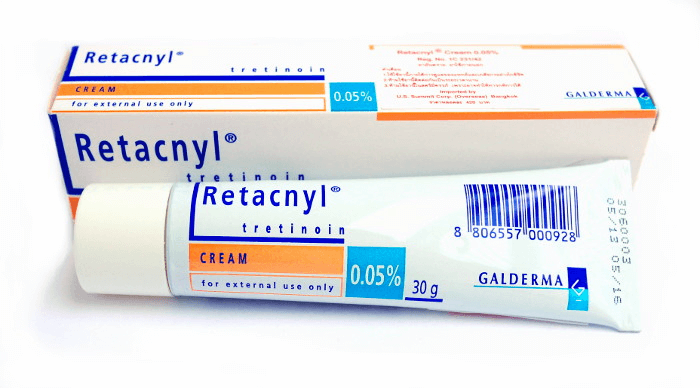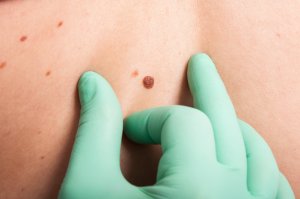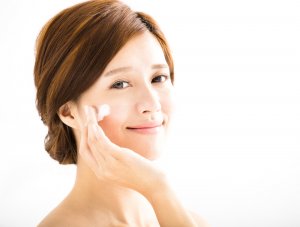
Topical Retinoids for Acne
Topical retinoids for acne are one of the cornerstone therapies for treatment and maintenance.
It works by effectively targeting inflammation, clogged pores and improving skin turnover.
- Professional | Established | Trusted
- Increase cell turnover, reduced inflammation and comedomes
- Improves acne scarring and pigmentation
- Initial dryness, redness, itchiness and peeling is normal

What Are Retinoids For Acne?
Topical retinoids for acne treatment are derived from Vitamin A. The history of retinoid use in modern day medicine dates back more than 50 years. It was first reported in 1969 that the topical retinoid, tretinoin actively treats blackheads and whiteheads (open and closed comedomes respectively), and prevents their formation in the first place. The compound 13-cis retinoic acid, otherwise known commonly as oral isotretinoin, was extensively studied in Roche Laboratories in Switzerland, and gained FDA approval in 1982 for cystic and severe acne vulgaris.
OUR APPROACH
HOW DR.NG TREATS ACNE
As a clinician with more than 15 years of experience, Dr Ng. understands the impact of how acne can affect an individual. Acne knows no boundaries, afflicting a wide range of age groups and affecting both genders for varying lengths of time. Dr. Ng provides a patient-centric approach that is backed by the latest scientific evidence as well as his own wealth of experience to create a care plan for the best acne treatment that is unique to your skin type. Early intervention can help prevent acne scars, restore your skin and confidence.

How Do Retinoids for acne Work?
From multiple studies, it has been established that there are 4 main changes within the hair follicle and sebaceous gland unit that ultimately result in acne. There is increased sebaceous gland size (sebaceous gland hyperplasia) and activity. This hormonally mediated event explains the increased oiliness experienced by many individuals with acne. In addition, the abnormal shedding of skin cells leads to closed and open comedomes (whiteheads and blackheads respectively). This leads to an ideal environment for Cutibacterium (formerly Propionebacterium acnes) to proliferate and cause inflammation within the skin.
Retinoids for acne exert their biological effects through cellular nuclear receptors. The retinoid molecule activates the retinoic acid receptors within the cells. This increases the turnover of cells within the follicles and leads to enhanced shedding of skin. In turn, existing comedomes are expelled and microcomedomes, which are early acne lesions that are not yet visible are prevented from forming. These changes the micro-environment within the skin, making it less conducive for Cutibacterium to proliferate and cause inflammation.

Are Topical Retinoids Similar to Retinols?
Over the counter retinols are comparatively weaker in terms of their biological activity compared to retinoids prescribed by your doctor. The effects are milder and may not bring about a significant clinical change when treating a condition such as acne vulgaris. Over-the-counter retinols are in ester forms such as retinyl palmitate, retinyl linoleate, retinaldehyde, propionic acid, or retinyl acetate. These over the couter retinol products contain a much smaller concentration of active retinoic acid compared to prescription retinoids.
Action of Retinoids
The increase in skin cell turnover results in the renewal of the epidermal layer. Not only is collagen synthesis enhanced but less collagen is degraded when topical retinoids are applied prior ro sun exposure.
Topical retinoids reduces oxidative stress through its anti0xidant and free radical scavenging abilities.
By increasing the turnover of cells within the hair follicles and preventing the formation of comedomes, the change of the micro-environment reduces the growth of C.acnes.
Topical retinoids reduce sebum production, one of the core factors implicated in acne formation.
By reducing the accumulation of melanin and the the enzymes involved in melanin synthesis, most patients notice an improvement in hyperpigmentation such as post-inflammatory hyperpigmentation and photodamaged skin.
Topical retinoids act as a UV filter, thus reducing skin redness and DNA damage within skin cells.
what are the types of retinoids for acne



Retinoids are currently divided into 4 generations with respect to their molecular structure and receptor sensitivity. The newer fourth generation retinoids are more selective in its targeted action and is associated with good tolerability in most individuals.
- First generation retinoid (Non-selective): Retinols, Retinals, Tretinoin
- Second generation retinoid: Etretinate and Acitretin (only exisits as oral form)
- Third generation retinoid: topical Adapalene, Tazarotene
- Fourth generation retinoid (Selective and less irritation profile): topical Trifarotene
What Are The available Retinoids For Acne?
There are different types of topical retinoids approved for acne treatment in the market. They differ in strengths (concentration), tolerability and combination with other drugs.
- Adapalene 0.1% and 0.3%
- Tazarotene 0.1%
- Tretinoin0.01%, 0.025%, 0.038%, 0.04%, 0.05%, 0.08%, and 0.1%
- Isotretinoin 0.05% and 0.1%
- Trifarotene 0.005% cream
Retinoids may be in fixed combination with benzoyl peroxide or an antibiotic. These include:
- Epiduo (Adapalene 0.1% and Benzoyl Peroxide 2.5%)
- Clindoxyl (Clindamycin 1% and Benzoyl Peroxide 5%)
how effective are Topical Retinoids For Acne?

In many clinical trials, it has been proven that retinoids are effective for clearing up both comedomal and inflammatory acne vulgaris. Generally, you can expect about 70-80% improvement rate after 12 weeks of application. A fixed dose combination of Adapalene with a benzoyl peroxide such as Epiduo is superior to Adapalene monotherapy alone. While there may be an initial increase in skin irritation in the first 1-2 weeks, most of the symptoms resolved by 4-6 weeks after consistent use of the product. As acne vulgaris is considered a chronic inflammatory condition of the hair follicle and sebaceous gland unit, a retinoid based treatment shows sustained improvement even beyond 12 months.
Besides treating active acne and preventing the formation of new acne, topical retinoids have shown to improve scarring and post-inflammatory hyperpigmentation. A study conducted using Adapalene 0.3% showed an improvement in 1 to 2 scar grades and skin texture after 24 weeks. Retinoids improve post-inflammatory hyperpigmentation by increasing skin cell turnover and reducing melanin transfer to skin cells.
Aklief (Trifarotene) cream, the new fourth generation retinoid for facial and truncal acne is approved for those aged 9 years of old. Improvement can be seen in as little as 2 weeks and long lasting effects for up a 52 weeks is seen in most patients.
What Are The Side Effects of Retinoids?

The tolerability of retinoids depend on skin type, vehicle (gel or cream), concentration and the type of retinoid. Individuals with sensitive skin (history of skin irritation with facial and cosmetic products) tend to have more irritation with retinoids. Generally, the best tolerated gel is Adapalene and the best tolerated cream is Aklief (Trifarotene).
It is common to experience mild to moderate degrees of skin redness, peeling, irritation and dryness within the first 1-2 weeks of starting your retinoid therapy which will eventually subside. These changes occur in the first 1-2 weeks during the normal shedding process as skin cells become less glued to each other and their arrangement is lost. Subsequently, the skin cells are re-arranged, less peeling and irritation occurs. Tretinoin 0.05% resulted in 60% of individuals experiencing some skin irritation compared with 19% irritation rate with Adapalene 0.1%.
How Do I Apply Retinoids?

As you can tell, topical retinods are higly effective in treating and preventing new acne. However, the issue of tolerability can cause discomfort and may stop some individuals from continuing treatment. Here are some tips that helps to ease you into your acne treatment journey:
- Awareness that mild irritation is common, and will subside within 3-4 weeks.
- Start with a pea size (or even half a pea size) amount and apply thinly to the affected areas.
- Avoid exfoliation and over-cleansing. Use a gentle cleanser.
- Apply our topical retinoids gradually. Start with every 3rd day for the first 2 weeks, then alternate day on the 3rd and 4th week. Once there is no irritation, apply nightly for best effect.
- Apply a gentle moisturizer that is non-comedogenic.
- Short contact therapy i.e. wipe off the retinoid after 20-30 minutes for those with skin sensitivity.
Which Is The Best Retinoid For Acne?
In a recent study, it has been shown that the differences between the retinoids are minor. More important than choosing the type of retinoid, is what type of retinoids work best at a particular concentration. Topical adapalene showed the best tolerability among all the retinoids. A fixed combination Adapalene with Benzoyl peroxide is superior compared to monotherapy and is well tolerated in majority of individuals. The latest 4th generation Aklief trifarotene cream has been proven to have rapid onset of action and excellent tolerability.
Frequently Asked Questions About Retinoids For Acne
Results from topical retinoids can vary depending on the individual and the condition being treated. In general, it may take several weeks to months to see noticeable improvement in acne, fine lines, and hyperpigmentation.
Common side effects of topical retinoids include dryness, peeling, redness, and irritation. These side effects are usually mild and can often be managed by using a moisturizer and adjusting the frequency of application. It’s also important to avoid waxing or abrasive skincare products while using retinoids.
Topical retinoids are generally safe for most people, but they may not be suitable for everyone. Pregnant or breastfeeding women should avoid using retinoids due to potential risks to the fetus or infant. Individuals with sensitive skin or certain skin conditions may also need to use retinoids with caution or under the guidance of a doctor.
Yes, topical retinoids can be used in conjunction with other skincare products, but it’s important to avoid products that may be too harsh or abrasive, as they can exacerbate irritation. Gentle cleansers and moisturizers are typically recommended, and it’s essential to use sunscreen during the day to protect the skin from sun damage.
Individuals with sensitive skin may experience more irritation when using topical retinoids. It’s best to start with a lower concentration and apply the medication less frequently. You can also buffer the retinoid with a moisturizer to reduce irritation.
Yes, topical retinoids can increase sensitivity to sunlight. It’s crucial to use sunscreen daily and limit sun exposure, especially during peak hours. In addition, some retinoids are degraded by UV exposure limiting their effectiveness.
schedule a consultation for topical retinoids acne treatment in singapore
We treat a range of acne and acne scars at both our clinics in Woodlands and Kovan. Topical retinoids for acne have helped countless patients clear and keep acne at bay. Dr. Ng makes it his mission to match each patient to the most effective acne treatment according to your lifestyle, skin condition and budget. Schedule a consultation with us today, so you can find out more.
Request a CallBack
Get in touch with us with any questions, pricing, or bookings.
Or give us a call at +65 6769 6007 | WhatsApp us +65 9855 3022
References:
- Kolli, S.S., Pecone, D., Pona, A. et al. Topical Retinoids in Acne Vulgaris: A Systematic Review. Am J Clin Dermatol (2019).
- Culp L, Moradi Tuchayi S, Alinia H, Feldman SR. Tolerability of topical retinoids: are there clinically meaningful differences among topical retinoids? J Cutan Med Surg. 2015;19:530–8.
- Dunlap FE, Baker MD, Plott RT, Verschoore M. Adapalene 0.1% gel has low skin irritation potential even when applied immediately after washing. Br J Dermatol. 1998;139(Suppl 52):23–5.
- Leyden, J., Stein-Gold, L. & Weiss, J. Why topical retinoids are mainstay of therapy for acne. Dermatol Ther (Heidelb) (2017) 7: 293.
- Grimes P, Callender V. Tazarotene cream for postinflammatory hyperpigmentation and acne vulgaris in darker skin: a double-blind, randomized, vehicle-controlled study. Cutis. 2006;77:45–50.
- Patel M, Leung S, Chien AL, Xu H, Audibert F, Kerrouche N, Rueda MJ, Kang S. Improvement in atrophic acne scars by topical adapalene 0.3% gel is associated with induction of procollagen I and III. Society of Investigative Dermatology. Albuquerque, NM2014.




